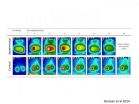(Press-News.org) Children who have been abused or neglected early in life are at risk for developing both emotional and physical health problems. In a new study, scientists have found that maltreatment affects the way genes are activated, which has implications for children's long-term development. Previous studies focused on how a particular child's individual characteristics and genetics interacted with that child's experiences in an effort to understand how health problems emerge. In the new study, researchers were able to measure the degree to which genes were turned "on" or "off" through a biochemical process called methylation. This new technique reveals the ways that nurture changes nature—that is, how our social experiences can change the underlying biology of our genes.
The study, from researchers at the University of Wisconsin, Madison, appears in the journal Child Development. Nearly 1 million children in the United States are neglected or abused every year.
The researchers found an association between the kind of parenting children had and a particular gene (called the glucocorticoid receptor gene) that's responsible for crucial aspects of social functioning and health. Not all genes are active at all times. DNA methylation is one of several biochemical mechanisms that cells use to control whether genes are turned on or off. The researchers examined DNA methylation in the blood of 56 children ages 11 to 14. Half of the children had been physically abused.
They found that compared to the children who hadn't been maltreated, the maltreated children had increased methylation on several sites of the glucocorticoid receptor gene, also known as NR3C1, echoing the findings of earlier studies of rodents. In this study, the effect occurred on the section of the gene that's critical for nerve growth factor, which is an important part of healthy brain development.
There were no differences in the genes that the children were born with, the study found; instead, the differences were seen in the extent to which the genes had been turned on or off. "This link between early life stress and changes in genes may uncover how early childhood experiences get under the skin and confer lifelong risk," notes Seth D. Pollak, professor of psychology and pediatrics at the University of Wisconsin, Madison, who directed the study.
Previous studies have shown that children who have experienced physical abuse, sexual abuse, and neglect are more likely to develop mood, anxiety, and aggressive disorders, as well as to have problems regulating their emotions. These problems, in turn, can disrupt relationships and affect school performance. Maltreated children are also at risk for chronic health problems such as cardiac disease and cancer. The current study helps explain why these childhood experiences can affect health years later.
The gene identified by the researchers affects the hypothalamic-pituitary-adrenal (HPA) axis in rodents. Disruptions of this system in the brain would make it difficult for people to regulate their emotional behavior and stress levels. Circulating through the body in the blood, this gene affects the immune system, leaving individuals less able to fight off germs and more vulnerable to illnesses.
"Our finding that children who were physically maltreated display a specific change to the glucocorticoid receptor gene could explain why abused children have more emotional difficulties as they age," according to Pollak. "They may have fewer glucocorticoid receptors in their brains, which would impair the brain's stress-response system and result in problems regulating stress."
The findings have implications for designing more effective interventions for children, especially since studies of animals indicate that the effects of poor parenting on gene methylation may be reversible if caregiving improves. The study also adds to what we know about how child maltreatment relates to changes in the body and mind, findings that were summarized recently in an SRCD Social Policy Report by Sara R. Jaffee and Cindy W. Christian.
INFORMATION:
This study was supported by the National Institute of Mental Health, the Waisman Center at the University of Wisconsin, and the Eunice Kennedy Shriver National Institute of Child Health and Human Development.
Summarized from Child Development, Associations Between Early Life Stress and Gene Methylation in Children by Romens, SE (formerly at University of Wisconsin, Madison, now at University of Pittsburgh), McDonald, J (formerly at University of Wisconsin, Madison, now at William S. Middleton Memorial Veterans Hospital), Svaren, J, and Pollak, SD (University of Wisconsin, Madison). Copyright 2014 The Society for Research in Child Development, Inc. All rights reserved.
Stress tied to change in children's gene expression related to emotion regulation, physical health
2014-07-24
ELSE PRESS RELEASES FROM THIS DATE:
Study links autistic behaviors to enzyme
2014-07-23
RIVERSIDE, Calif. — Fragile X syndrome (FXS) is a genetic disorder that causes obsessive-compulsive and repetitive behaviors, and other behaviors on the autistic spectrum, as well as cognitive deficits. It is the most common inherited cause of mental impairment and the most common cause of autism.
Now biomedical scientists at the University of California, Riverside have published a study that sheds light on the cause of autistic behaviors in FXS. Appearing online today (July 23) in the Journal of Neuroscience, and highlighted also on the cover in this week's print issue ...
New York law offers nurses more recognition, responsibility
2014-07-23
(NEW YORK, NY, July 24, 2014) – If past experience is anything to go by, nurse practitioners in New York State are about to get a lot more recognition for their contributions to primary care. In Massachusetts, laws already on the books allowing NPs to provide primary care offer nurses more recognition of their contributions to patient care and better relationships with physicians and administrators, compared with colleagues in New York, according to a study from Columbia University School of Nursing, published in Health Care Management Review.
"This suggests that the ...
Smarter than a first-grader?
2014-07-23
In Aesop's fable about the crow and the pitcher, a thirsty bird happens upon a vessel of water, but when he tries to drink from it, he finds the water level out of his reach. Not strong enough to knock over the pitcher, the bird drops pebbles into it — one at a time — until the water level rises enough for him to drink his fill.
Highlighting the value of ingenuity, the fable demonstrates that cognitive ability can often be more effective than brute force. It also characterizes crows as pretty resourceful problem solvers. New research conducted by UC Santa Barbara's Corina ...
How honey bees stay cool
2014-07-23
MEDFORD/SOMERVILLE, Mass. – Honey bees, especially the young, are highly sensitive to temperature and to protect developing bees, adults work together to maintain temperatures within a narrow range. Recently published research led by Philip T. Starks, a biologist at Tufts University's School of Arts and Sciences, is the first to show that worker bees dissipate excess heat within a hive in process similar to how humans and other mammals cool themselves through their blood vessels and skin.
"This study shows how workers effectively dissipate the heat absorbed via heat-shielding, ...
Hormones after breast cancer: Not fuel for the fire after all?
2014-07-23
A new study supports a growing body of research suggesting a safe and effective role for natural steroid hormones in treating postmenopausal breast cancer, with fewer detrimental side effects and improved health profile than with standard anti-hormone therapies. The study will be published in final format today in the open-access journal Reproductive Biology and Endocrinology.
Breast cancer is the most frequently diagnosed cancer in women in the United States. Approximately 70% of breast cancers are diagnosed in postmenopausal women. Major clinical trials and experimental ...
'Big picture' thinking doesn't always lead people to indulge less, study says
2014-07-23
CHAMPAIGN, Ill. — Buy the latest electronic gizmo du jour, or use that money to fix a leaky roof? Go out with friends, or stay home to catch-up on work to meet that looming deadline? And after you've finished that big project, do you treat yourself to a slice of chocolate cake or settle for a piece of fruit?
These are the kind of self-control dilemmas that people face all the time. And according to research from a University of Illinois expert in new product development and marketing, self-focus plays an important role in how consumers make decisions.
When prompted ...
Urban heat boosts some pest populations 200-fold, killing red maples
2014-07-23
New research from North Carolina State University shows that urban "heat islands" are slowly killing red maples in the southeastern United States. One factor is that researchers have found warmer temperatures increase the number of young produced by the gloomy scale insect – a significant tree pest – by 300 percent, which in turn leads to 200 times more adult gloomy scales on urban trees.
"We'd been seeing higher numbers of plant-eating insects like the gloomy scale in cities, and now we know why," says Adam Dale, a Ph.D. student at NC State and lead author of two papers ...
NASA sees Typhoon Matmo making second landfall in China
2014-07-23
NASA's Terra satellite passed over Typhoon Matmo when it was moving through the Taiwan Strait for its final landfall in mainland China.
On July 23 at 02:45 UTC (July 22 at 10:45 p.m. EDT), the Moderate Resolution Imaging Spectroradiometer or MODIS instrument aboard NASA's Terra satellite captured a picture of Typhoon Matmo after its center crossed the northern part of the island nation of Taiwan and entered the Taiwan Strait. The Taiwan Strait is the body of water between western Taiwan and southeastern China. The MODIS image showed a cloud-covered center of circulation, ...
Targeting the brain to treat obesity
2014-07-23
Unlocking the secrets to better treating the pernicious disorders of obesity and dementia reside in the brain, according to a paper from American University's Center for Behavioral Neuroscience. In the paper, researchers make the case for treating obesity with therapies aimed at areas of the brain responsible for memory and learning. Furthermore, treatments that focus on the hippocampus could play a role in reducing certain dementias.
"In the struggle to treat these diseases, therapies and preventive measures often fall short. This is a new way for providers who treat ...
UNC researchers find unsuspected characteristics of new CF drugs, offering potential paths to more effective therapies
2014-07-23
In lab experiments using tissue samples cultured from cystic fibrosis patients, scientists at the UNC School of Medicine and the UNC Marsico Lung Institute have shown that a new CF drug counteracts the intended beneficial molecular effect of another CF drug.
The finding, published today in the journal Science Translational Medicine, shows how a mutant CFTR protein becomes unstable and loses its ability to function properly when in the presence of the two drugs. The research offers several insights into how novel CF pharmacotherapies could be improved.
“In our human ...






